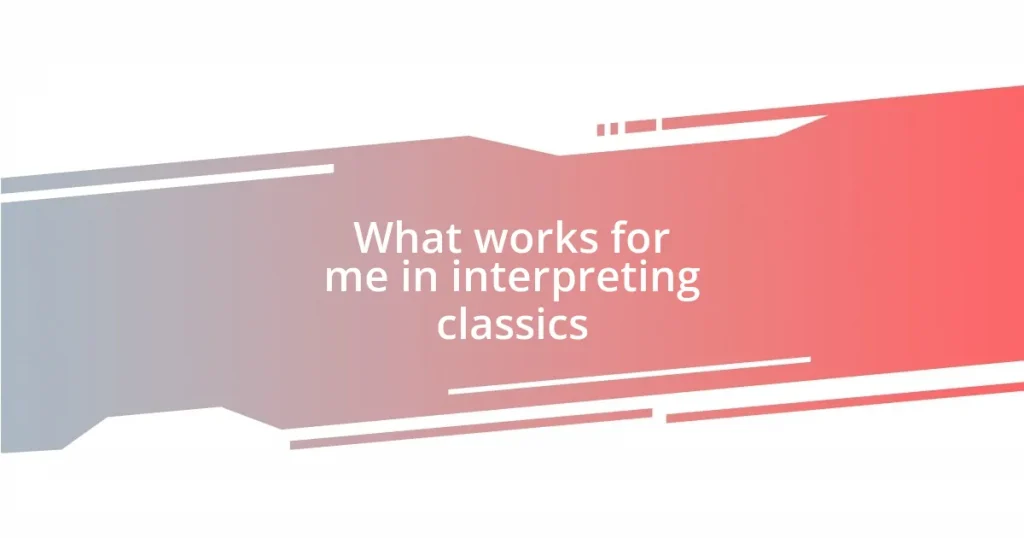Key takeaways:
- Community theater fosters connections and a sense of belonging through shared storytelling and collaboration.
- Participants gain confidence, communication skills, and lasting friendships while exploring personal expression.
- Each role in a production, from actors to technical crew, is essential for a successful performance, highlighting the importance of teamwork.
- Overcoming challenges such as self-doubt and time management helps transform fear into growth and enriches the experience for all involved.

Introduction to Community Theater
Community theater is a vibrant tapestry woven from the threads of local talent and shared passion. I can still recall the first time I set foot in a small, earthy auditorium, the scent of fresh paint mingling with the excitement of the night. It struck me that this wasn’t just about performance; it was about people coming together, united by their love for storytelling.
Have you ever considered how a simple production can transform a community? I remember witnessing that transformation firsthand during a play about local history. After the final curtain fell, audience members stayed behind, sharing laughter and memories inspired by the stories unfolding on stage. Those moments revealed to me how community theater forges connections, fostering a sense of belonging that runs deeper than just the act of watching a show.
The beauty of community theater lies in its accessibility. It welcomes anyone with a spark of creativity, regardless of experience. I met a retired schoolteacher in my acting class, who had never stepped onto a stage before, yet discovered a hidden passion within her. Observing her journey reinforced my belief that community theater offers a safe space for personal expression and growth, reminding us all that we have a story worth sharing.

Benefits of Joining Community Theater
Joining community theater offers an array of benefits that extend far beyond the stage. For me, stepping into that world enhanced my confidence in ways I never imagined. I can still vividly remember the first time I delivered a line in front of an audience; my heart raced, but the applause that followed filled me with an exhilarating sense of accomplishment. This growth in self-assurance is a common thread among many participants.
Here are a few key benefits to consider:
- Building Confidence: Each audition or performance pushes you to step out of your comfort zone.
- Stronger Communication Skills: Working with others hones your ability to express ideas clearly while connecting with an audience.
- Creative Outlet: It serves as a canvas for self-expression, allowing you to explore different facets of your personality.
- Community Connections: You develop lasting relationships with fellow cast members, creating a support network that extends beyond rehearsals.
Through these experiences, I found myself making unexpected friendships and forging bonds with people I wouldn’t have met otherwise. The camaraderie among cast members is like a warm embrace; those late-night rehearsals turned into moments of shared laughter and inspiration that lit up my heart.

Roles and Responsibilities in Productions
The dynamics of community theater are a fascinating blend of collaboration and creativity. Each role, from the lead actor to the stage manager, plays a crucial part in bringing a production to life. I remember once stepping into the role of assistant director, a position I had never imagined myself in. My responsibility was to support the director, ensuring rehearsals flowed smoothly, but I found myself learning so much about the process—like how vital communication is when coordinating between the cast and crew.
In productions, actors are often the most visible members, delivering the story’s heart through their performances. Meanwhile, behind the scenes, stagehands and technical crew members tirelessly work to set the scene and manage lighting and sound cues. It’s remarkable how these unsung heroes contribute to the magic. One time, during a frantic dress rehearsal, we faced a lighting mishap just minutes before going on stage. The quick thinking of our stage manager saved the day, reminding me of how each person’s expertise keeps the production on track.
The collaboration doesn’t stop at rehearsals; it’s essential during performances too. Each crew member, from the sound technician to the costume designer, has unique responsibilities that intertwine to create a seamless experience. I often think about how I learned to appreciate every facet of the production, especially when I watched my friends transform their anxiety into focus as they fulfilled their roles. The chemistry between cast and crew is palpable—one misstep can throw the whole show off, which just adds to that thrilling sense of community we build together.
| Role | Responsibilities |
|---|---|
| Actor | Brings the character to life through performance and memorization of lines. |
| Director | Oversees the production, guiding the actors and making creative decisions. |
| Stage Manager | Coordinates rehearsals and manages backstage tasks, ensuring everything runs smoothly. |
| Technical Crew | Handles lighting, sound, and set changes, crucial for creating the right atmosphere. |
| Costume Designer | Creates costumes that reflect characters and help convey the story visually. |

Overcoming Challenges in Community Theater
The world of community theater is filled with challenges that can feel overwhelming at first. I distinctly recall the night before my first opening performance, surrounded by a mix of excitement and sheer panic. What if I forgot my lines? What if the audience didn’t connect with our story? It was that very moment of self-doubt that pushed me to channel my nervous energy into something constructive. I learned that addressing challenges head-on, whether by rehearsing with a friend or visualizing the audience’s positive feedback, often transformed fear into focus.
Another obstacle that surfaces frequently is managing differing opinions within the group. I remember a heated discussion during a production meeting over how to interpret a character. At first, the tension was palpable, but I found that embracing those differences led to deeper conversations and, ultimately, a richer portrayal of our roles. Have you ever noticed how collaboration can sometimes bring out the best ideas, even from those whose views you initially disagree with? It’s in those moments of conflict that I discovered true growth, not just as an actor but as a teammate.
Lastly, there’s the time commitment that can be daunting for many. Balancing jobs, family, and theater often felt like an impossible juggling act. Yet, the passion I found within those rehearsals made it worthwhile. I started prioritizing my schedule—an hour here for rehearsal, a few minutes there for lines—and before long, I no longer felt overwhelmed. Instead, I was creating a rhythm that worked for me. Isn’t it incredible how passion can motivate us to find time for the things we love? When I eventually stepped onto that stage, it became clear that the struggles only made the triumphs sweeter.

Building Connections Through Theater
Connecting with others through theater is something I’ve always found deeply rewarding. I still vividly remember opening night of a play I was part of where, amidst the butterflies in my stomach, I locked eyes with a fellow actor during a particularly intense scene. It was in that split second that I realized we were not just performing for an audience—we were sharing an experience. Have you ever felt a thrill when you harmonized perfectly on stage with someone else? That collective energy electrifies the room, creating a bond that extends far beyond the final curtain call.
What truly astonished me was how friendships blossomed in rehearsals. At one point, I broke into laughter during a serious scene because of an accidental mishap with a prop. Instead of feeling embarrassed, I was relieved to see others chuckling along with me. It was a turning point; that shared laughter eased the tension and strengthened our connection, reminding me of the beauty of vulnerability in a creative space. I often wonder: how many friendships have blossomed from such moments of spontaneity in community theater?
As rehearsals continued, I discovered that these connections could also provide a nurturing support system. During a particularly tough week, one of my cast mates reached out and invited me for coffee to discuss our characters’ motivations. It was in those conversations, filled with laughter and genuine curiosity, that I found a deeper understanding of not only my role but also their struggles and triumphs. Have you ever realized that talking about a shared passion can bridge gaps and open up new perspectives? In my experience, these interactions were not just about theater; they were about building a community that uplifted one another, encouraging collective growth.















